In May 2004, the Russian Federation announced its intention to host in 2005 a Europe and North Asia (ENA) Forest Law Enforcement and Governance ( FLEG ) process. The Preparatory Conference for this initiative
convened from 6-8 June 2005 in Moscow. The Ministerial Conference is expected to meet in November or December 2005 in the Russian Federation. The Preparatory Conference
was hosted by the Ministry of Natural Resources (MNR) of the Russian Federation.
The International Steering Committee (ISC) for this initiative held its first meeting in Moscow from 21-22 February 2005. The governments of Bulgaria, Canada, Finland, Germany, Turkey, Japan, Kazakhstan, Poland, Russia, Turkey, United Kingdom, United States, as well as the European Commission and World Bank accepted the Russian MNR's invitation to join the ENA FLEG ISC and were represented at the meeting. Italy and China were also invited but did not attend the first ISC meeting. The objective of the first ISC meeting was to formally initiate the ENA FLEG process as well as to provide guidance on its overall design. Key decisions include d an agreement to convene the Preparatory Conference and Ministerial Conference. The ISC met again on May 20, 2005 during the 5th session of the UN Forum on Forests in New York to discuss on and prepare for the ENA-FLEG Preparatory Conference, and to identify critical next steps towards the Ministerial Conference.
| In his welcoming remarks, Valery Roshupkin, Head of Federal Forestry Agency, Russian Ministry of Natural Resources, emphasized the importance of addressing the issue of illegal logging, and recalled the G-8's role in bringing prominence to the problem. He reiterated Russia 's commitment to eradicate illegal logging, and informed the meeting on national measures being taken and planned, in particular, the discussion of the new Forest Code by the Duma, and progress made in monitoring forests using remote sensing. |
| Kristalina Georgieva, Country Director of World Bank Moscow Office, Valery Roshupkin, Russian Ministry of Natural Resources, and Nikita Bantsekin, Ministry of Natural Resources of Russia |
| |
| Kristalina Georgieva, Country Director of World Bank Moscow Office, stressed that ENA is one of the most significant regions in terms of sustainable forest management. She focused on regional and national initiatives, the significance of the FLEG process, and the contribution made by the World Bank. |
| |
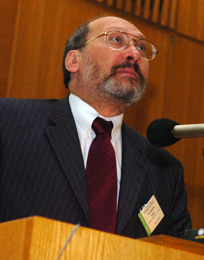 |
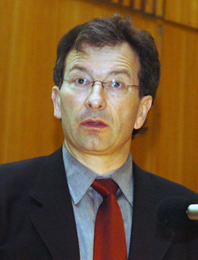 |
|
In the host country statement, Nikita Bantsekin, Ministry of Natural Resources of Russia (left), called on the preparatory conference to elaborate practical and effective mechanisms to address illegal logging, and updated participants on preparations for the Ministerial Conference in St. Petersburg in December 2005.
Gerhard Dieterle,
World Bank Agriculture and Rural Development Department, (center), highlighted the role of the ISC in providing guidance to the ENA FLEG and the Preparatory Conference. He said the meeting is designed to encourage an exchange of views and will define the scope of the upcoming Ministerial Meeting through an issue paper to be drafted over the next three days. Acknowledging broad stakeholder participation in the preparation of the Ministerial Conference, he noted the Preparatory Conference's overlap with a private sector meeting underway in Nagoya, Japan, which has impeded private sector attendance. |
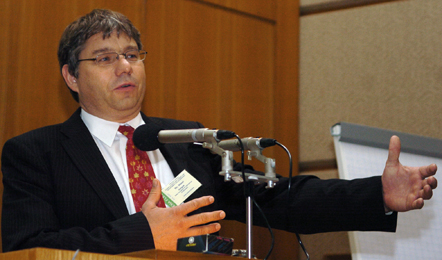 |
Jürgen Blaser, ENA FLEG Preparatory Conference Co-facilitator, presented an overview of global forest governance and specific issues in the ENA process, setting the context of law enforcement and governance across FLEG regions. Noting the scale of suspicious or illegal timber trade and associated revenue loss, he outlined six major areas of concern for FLEG: unauthorized forest conversion and tenure issues; livelihood issues; illegal activities by operators; timber theft, smuggling and illegal trade in wood and non-wood forest products; money laundering and manipulation of financial accounts; and corruption. |
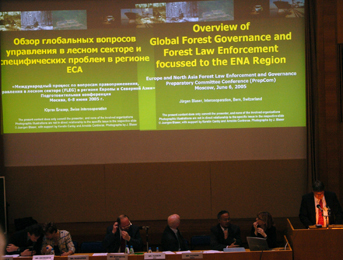 |
|
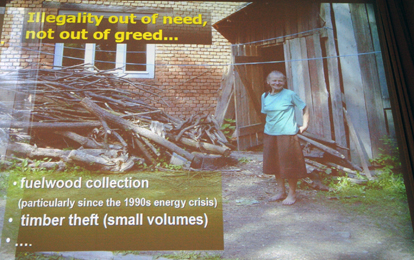 |
|
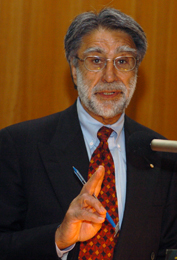 |
Jag Maini, ENA FLEG Preparatory Conference Co-facilitator, presented the goals and objectives for the ENA FLEG Ministerial process, noting the importance of finding common goals and objectives in a diversity of contexts, the need to seek strong political commitment and follow-up, and the significance of establishing meaningful partnerships with other stakeholders. Maini indicated that key aspects of a committed process include: the recognition that illegal logging is a worldwide problem; an emphasis on national roles and responsibilities; a broad definition of issues, in particular on a working definition of illegal logging; the value of consultations and collaboration with diverse stakeholders; and a commitment to communicate on follow-up actions to the process. |
|
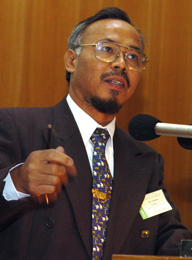 |
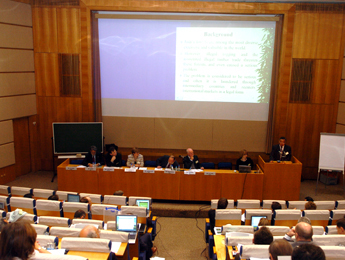 |
|
Tachrir Fathoni, Ministry of Forestry, Indonesia (left), discussed the experience of the East Asia FLEG process and Indonesia 's lessons learned on FLEG. He recalled a decision to hold a second ministerial meeting to review the progress on implementation of the 2001 Bali Declaration, an outcome of the EAP FLEG Ministerial. Fathoni indicated that actions from the EAP FLEG initiative include, inter alia : a comprehensive verification system that can differentiate between legal and illegal timber sources; bilateral agreements with the UK, Norway, Japan, China and South Korea; and listing forest crimes as an offence in Indonesian anti-money laundering legislation.
John Hudson, Department for International Development, UK (right), explained the G8 Communiqué on Illegal Logging, drafted by the G8 Environment and Development Ministers. Noting that the statement was drafted to provide a new political impetus, Hudson said the joint statement agreed to by Ministers committed them to a range of different actions, depending on where they could contribute most effectively. He noted the UK government would report on outcomes of the Communiqué, in light of the upcoming Russian Federation G8 Presidency in 2006.
|
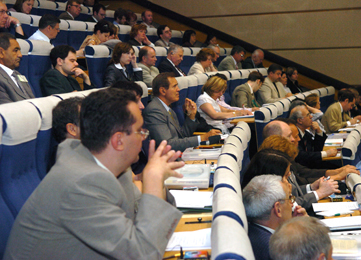 |
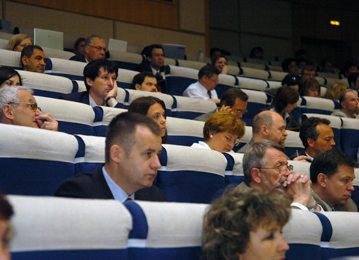 |
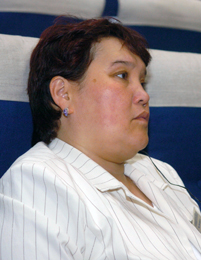 |
|
| Practical Experiences in the ENA Region |
| |
| In discussing expected goals and outcomes of the Preparatory Conference, Jürgen Blaser, ENA FLEG Preparatory Conference Co-facilitator, discussed identifying issues and
preparing for the Ministerial Conference |
| |
| Dmitry Churyko, Ilim Pulp Enterprise of Russia (left), reported on experiences in Northwest Russia, a key forest producing region. Noting that FLEG should comprehensively address forest issues, he highlighted enabling access to markets, new technologies such as satellite monitoring, voluntary certification, labeling, licensing of private enterprises, and law enforcement as key instruments to combat illegal logging. |
| Tapani Oksanen, Savcor Indufor of Finland, summarized experiences in low-income ENA countries. He said all ten countries surveyed suffer from chronic imbalance in the legal domestic timber supply and demand, disruption of energy supplies, and are affected by corruption and lack of transparency. He also presented suggestions on ways to strengthen FLEG in low-income countries, including: revising current forest policies; tackling high-level corruption; and closing the gap between the legal supply of and demand for timber. |
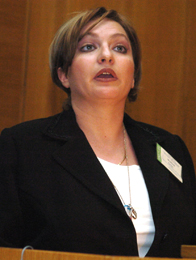 |
|
|
Emilja Bibolli, Directorate General of Forests and Pastures of Albania (left), drew delegates' attention to favorable trends in Albania 's national situation with regard to illegal logging, and explained the functions of the relevant inter-ministerial commission.
Tomasz Wojcik,
General Directorate of the State Forests of Poland (center), focused on the experience of his country as a new member of the European Union. He spoke of the peculiarities of the Polish situation with forest ownership, illegal logging and theft of forest products, and explained legislation and procedures employed for combating criminal practices.
Dolores Beloretchka, National Forestry Board at the Bulgarian Ministry of Agriculture and Forestry (right), reported on national actions to combat illegal logging, and informed the meeting about a recent regional Balkan workshop in support of the ENA FLEG. |
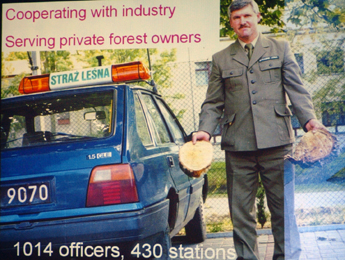 |
 |
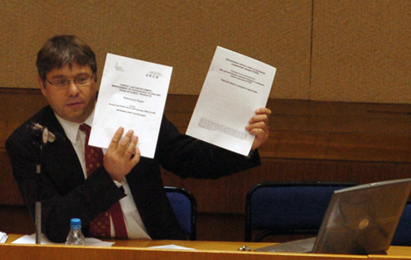 |
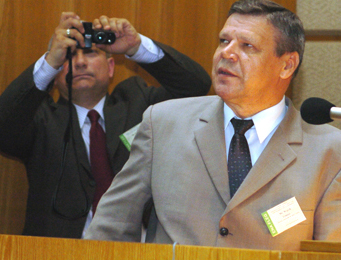 |
| Janis Birgelis, Ministry of Agriculture of Latvia, explained new national legislation and regulatory frameworks, and argued for maintaining the established forest practices, defining the functions of the state, and establishing balance between private and public rights. |
| Anatoly Petrov, All-Russian Institute for Continuous Education in Forestry, focused on problems encountered in the country's continuing transition to a market economy. He emphasized the need to create a balance of powers and functions between the federal and the subject local levels in the Russian Federation, and establish dialogue with business, with the latter assuming most functions, except control. He argued for educating the private sector and assuring transparent financial flows, and cautioned against haste in privatization. |
| Lars Laestadius, World Resources Institute and Global Forest Watch (left), highlighted the need for: promoting transparency and openness of information; cooperation among stakeholders to cut costs and heighten the credibility of information; enhanced monitoring using modern technologies; and dual focus on product and process. |
Nalin Kishor,
World Bank Agriculture and Rural Development Department (left) , introduced forest governance, institutions and livelihoods, stressing the centrality of forests to poverty reduction.
John Bazill, European Commission (right), presented the EU initiatives to combat illegal logging in particular its Action Plan for Forest Law Enforcement, Governance and Trade, which encompasses development cooperation, public procurement, voluntary partnerships, investment and purchasing policies, and legislative options. |
| Stakeholder Panel: Defining Major Issues |
| |
| Representing industry, Michael Tarasov, Thomesto Ltd/Metsäliitto Group (left), stressed the critical importance of good legislation and law enforcement; the major role of the State as the only forest owner; and the need to better target illegal operators. |
| |
Speaking as part of the NGO community, Mikhail Karpachevsky, Taiga Rescue Network (left), said civil society groups request proactive involvement in the preparation, conference work and follow-up implementation associated with the ENA FLEG Ministerial process.
On behalf of the NGO community, Kenichi Nakazawa, Friends of the Earth of Japan (right), noted the need to consider the environmental effects of timber trade,
and he added that exports and imports of illegal timber should be prohibited, and timber trade should not be liberalized unless environmental and social costs are included. |
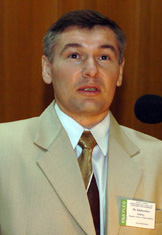 |
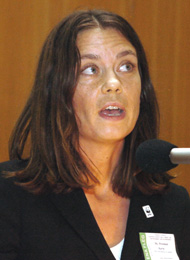 |
|
| |
| Andrey Zakharenkov, Forestry Research Institute in Russia (left), reported on an independent verification and certification partnership in the Khabarovski Krai region, which performs verification of legal origin and of legal compliance for validating legal timber.
Karin Wessman, WWF Global Forest and Trade Network (right), stressed the role of governments as major forest resource owners and consumers and stakeholders for the social agenda, and suggested that they could drive demand by public procurement policies. |
| |
|